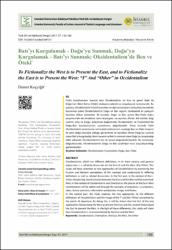Batı’yı Kurgulamak - Doğu’yu Sunmak, Doğu’yu Kurgulamak - Batı’yı Sunmak: Oksidentalizm’de Ben ve Öteki
Citation
KOÇYİĞİT, Demet. "Batı’yı Kurgulamak - Doğu’yu Sunmak, Doğu’yu Kurgulamak - Batı’yı Sunmak: Oksidentalizm’de Ben ve Öteki". İstanbul Üniversitesi Edebiyat Fakültesi Türk Dili ve Edebiyatı Dergisi, 57 (2017): 133-160.Abstract
Farklı tanımlamaları mevcut olan Oksidentalizm, en kısa ve genel ifade ile
Doğu’nun (Ben) Batı’yı (Öteki) mukayese ederek ve sorgulayarak tartışmasıdır. Bu
çalışma, Oksidentalizm’in farklı tanımları ve ilgili tartışmaların anlaşılmasına katkıda
bulunmak üzere Oksidentalizm’in Doğu ve Batı algısını inceleyerek iki yaklaşım
kanalına dikkat çekecektir. İlk kısımda, Doğu ve Batı ayrımı Ben-Öteki ilişkisi
çerçevesinde ele alındıktan sonra önyargılar, varsayımlar, fikirler, ikili zıtlıklar, bilgi
üretimi, imaj ve kurgu, özleştirme bağlamında Oksidentalizm ve Oryantalizm’de
Doğu-Batı karşılaşmasının aşamalarına değinilecektir. İkinci kısımda farklı
Oksidentalizm tanımlarının ve hareket noktalarının sunduğu Ben ve Öteki imajının
iki yöne doğru kanalize olduğu gösterilerek iki kanaldan ilkinin Doğu’yu sunmak
üzere Batı’yı kurguladığı; ikinci kanalın ise Batı’yı sunmak üzere Doğu’yu kurguladığı
iddia edilecek; Oksidentalizm’in bu iki kanalı değerlendirilecektir. Bu tartışmalar
doğrultusunda, Oksidentalizm’in Doğu ve Batı tarafından nasıl araçsallaştırıldığı
gösterilecektir. Occidentalism, which has different definitions, in its most concise and general
expression, is a scholarly discussion on the East (I) and the West (the Other). This
study will draw attention to two approaches of Occidentalism by examining the
Eastern and Western perceptions of this concept and understand its differing
definitions as well as related discussions. In the first part, in the context of the I–
Other relationship, the distinction between the East and the West will be examined.
Next, in the context of Occidentalism and Orientalism, the phases of the East–West
confrontation will be addressed through the concepts of prejudices, assumptions,
ideas, binary contrasts, information production, image, and fiction.
In the second part, the study explores the two approaches to the different
definitions of Occidentalism and the image of the “I” and the “Other,” presented by
the points of departure. By doing this, it will be shown that the first of the two
approaches fictionalized the West to present the East and the second fictionalized
the East to present the West. In the light of these differences, this study will show
how Occidentalism is instrumentalized by the East and the West.



















